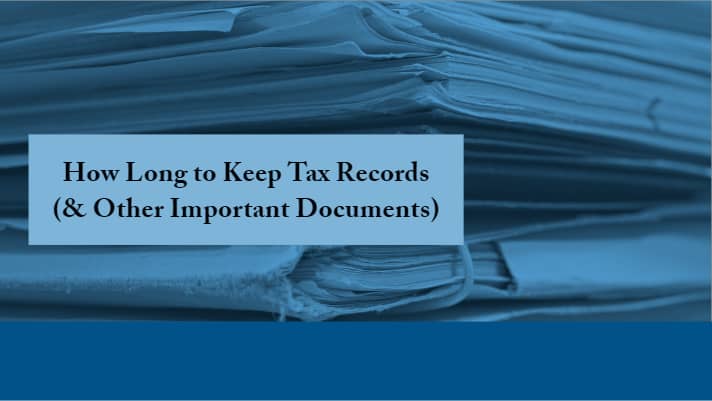No one enjoys gathering, sorting, and filing tax records, but it’s a necessary evil for the vast majority of Americans. Fortunately, you don’t have to keep everything forever. Here are our recommendations, based on IRS guidelines, for how long to keep tax records – and remember, this will save you time (and possibly money) in the long run.
Why should you save your tax records?
You should keep your tax records for many reasons. Obviously, you want to have a good record of your tax filings in case the IRS ever challenges one of your deductions, etc. You may also need tax records for unrelated matters such as loan applications and other situations where you may need to prove your income.
Though you might rarely need access to these records, it’s best to keep them organized and safe from humidity and other damaging situations. Otherwise, you may have trouble finding or viewing the records when you need them most – during an audit, for example.
What should you keep?
Most people have a lot of papers come through their homes each year. You can’t possibly keep every single document that crosses your desk or kitchen table. If you did, it would be impossible to find what you need when the occasion arises.
When it comes to taxes, you generally want to keep your primary documents along with supporting documentation. Here are the most common examples:
Primary Documents
• Tax Returns (including attachments and schedules)
Permanent Documents
• Wills
• Trust Documents
• Partnership Agreements
• Business Contracts
• Divorce Decrees
• Leases
• Basis in Property (any documents pertaining to the original cost or appreciation/ depreciation for your assets, such as the sales contract for your home or other real estate)
Expenses
You should keep supporting documentation for any expenses related to a line item, credit, or deduction on your tax return. These include:
• Cancelled Checks: These were once the most popular supporting record, but fewer people use checks these days, and even fewer banks mail copies of cancelled checks each month (as they used to do). Still, if your bank uploads images of your cancelled checks online or provides copies, it’s best to save them for later. You should also keep bank statements, which contain a line item listing of your transactions for a given period.
• Receipts, Sales Slips, and Invoices: You should have some form of paper record for every purchase you make that is reflected in your taxes. If possible, try to keep these organized according to the deduction or credit they support.
Income
There are two primary forms of supporting documents for income:
• W-2s are mailed to employees.
• 1099s are mailed to independent contractors. There are also various types of 1099s used for a myriad of other income situations, from cancelled debts to Health Savings Account (HSA) distributions.
If you receive either of these documents, make sure you keep copies with your tax return.
How long should you keep these documents?
You should generally keep all these documents a minimum of seven years. The IRS can challenge your taxes up to three years from the filing date.
However, there are situations where you might need to keep the documents even longer.
• If you file early each year, remember to keep the documents seven years from the tax due date because that is the date the IRS uses.
• If you pay your taxes after you file, keep the records at least seven years from the date of your last payment.
• There are also certain situations where the IRS recommends keeping your documents even longer.
Also, please note that there is no time limit for the IRS to investigate false or fraudulent returns. For this reason, some people choose to keep their tax records permanently.
In general, we recommend keeping all of your primary and permanent documents indefinitely. You may choose to toss your supporting documents once the IRS time limitation has elapsed, particularly if it would be possible to replace these documents in the future if needed.
If you have additional questions or concerns regarding how long to keep tax records, or any other document, please don’t hesitate to send us a message. If new IRS guidelines are released in the future, we will update our guidelines as well.



